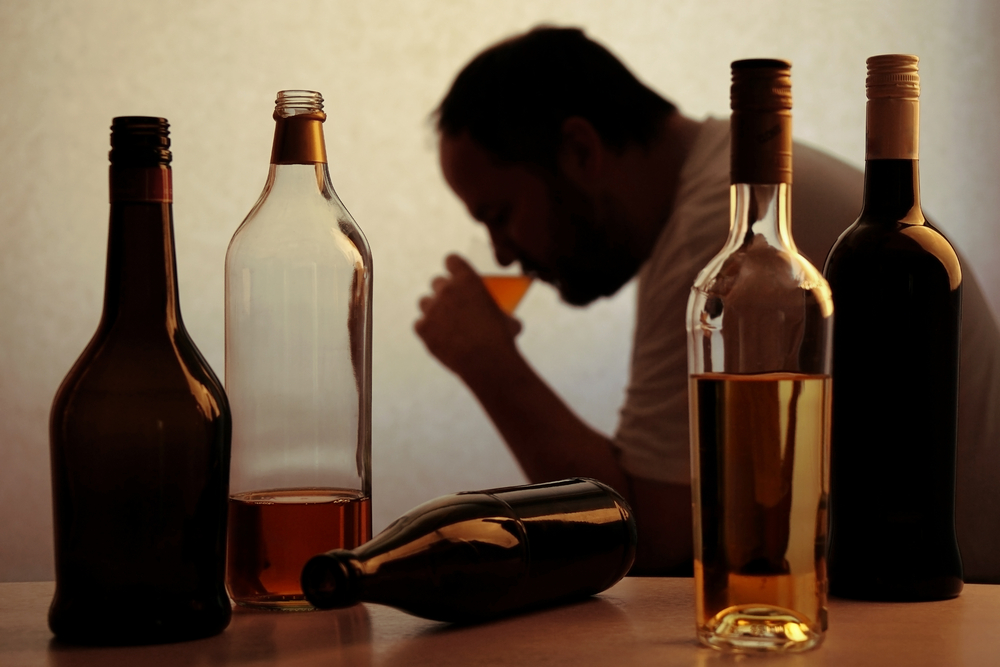
Alcohol is a psychoactive, central nervous system depressant that works by slowing down vital functions in one’s body. Harvard Health explains that “alcohol directly influences the stomach, brain, heart, gallbladder, and liver. It affects levels of lipids (cholesterol and triglycerides) and insulin in the blood, as well as inflammation and coagulation. It also alters mood, concentration, and coordination.” A person that is addicted to alcohol is colloquially known as an alcoholic. Alcohol addiction, also known as alcoholism or alcohol use disorder (AUD), is listed in the Diagnostic and Statistical Manual of Mental Disorders, Fifth Edition (DSM-5) as a chronic neurological disorder. According to the Mayo Clinic, alcoholism is characterized by a “pattern of alcohol use that involves problems controlling your drinking, being preoccupied with alcohol, continuing to use alcohol even when it causes problems, having to drink more to get the same effect, or having withdrawal symptoms when you rapidly decrease or stop drinking.” Alcohol use disorder is a complex disease involving physical and psychological changes that directly increase one’s risk for developing an array of adverse short- and long-term effects. Five of the most common effects of alcohol addiction include the following:
- Increases risk of certain cancers: Approximately 50% of cancers of the mouth, pharynx, and larynx in America are associated with heavy drinking. Further, according to a study in the July 13 edition of Lancet Oncology, at least 4% of the world’s newly diagnosed cases of esophageal, mouth, larynx, colon, rectum, liver, and breast cancers in 2020, can be attributed to alcohol consumption.
- Impairs sleep: A 2014 University of Missouri-Columbia study found that drinking alcohol as a method of getting to sleep disrupts the body’s sleep homeostasis, or sleep regulator, and adversely affects one’s natural sleep cycles. The disruption in sleep patterns caused by alcohol can affect one’s energy levels and mood.
- Shifts hormone levels: Alcohol can lower testosterone levels in men, and can increase testosterone and estradiol levels in women. Increased hormone levels can stimulate oil glands, and increased oil can lead to clogged pores and acne.
- Prompts weight gain: Alcohol contains calories, and although they are metabolized differently than food, they must be accounted for. Drinking alcohol can suppress the hormone leptin, which controls appetite. Research has found that the presence of alcohol can impede the release of glucose, elevating one’s blood sugar levels, which in turn can increase the risk for developing cardiovascular complications and metabolic problems (e.g., diabetes).
- Exacerbates anxiety: While drinking alcohol can result in fleeting feelings of relaxation, it is not uncommon for an individual to experience increased feelings of anxiety after the initial effects of alcohol wear off. Alcohol reduces the amount of serotonin (the neurotransmitter that works to stabilize one’s mood, happiness, and feelings of well-being) in the brain, and low levels of serotonin are associated with increased anxiety.
Treatment In Calabasas
Calabasas is a city in California. It is a well-known suburb of Los Angeles, located west of the San Fernando Valley and north of the Santa Monica Mountains. Over the past decade, the city of Calabasas has grown in its reputation for luxury as well as for privacy which makes it a hidden gem for residential living for society’s elite, and one of the most desirable destinations in Los Angeles County. It is also home to a plethora of highly qualified mental health clinicians providing an array of therapeutic services and treatment options.
The information above is provided for the use of informational purposes only. The above content is not to be substituted for professional advice, diagnosis, or treatment, as in no way is it intended as an attempt to practice medicine, give specific medical advice, including, without limitation, advice concerning the topic of mental health. As such, please do not use any material provided above to disregard professional advice or delay seeking treatment.


